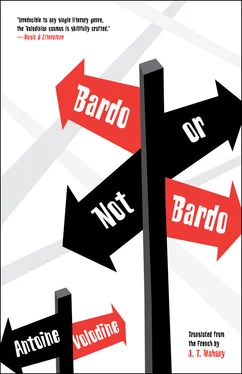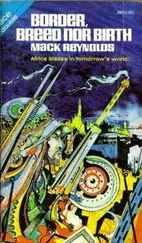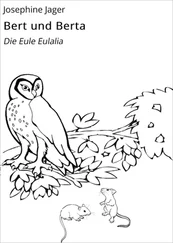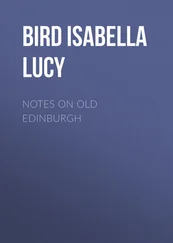“Listen to me carefully, Schmollowski,” says the lama. “I am Jeremiah Schlumm, a Buddhist lama from the Association of Red Bonnets Anonymous, a tantric mutual aid organization. The Association has entrusted me with reading to you the Bardo Thödol for forty-nine days. I know you are not a member of the Buddhist community, but I know on the other hand that you have read and reread this book, the Book of the Dead , during your long stay in captivity. I know you had it in your possession. We sent it to you along with candies, undergarments, and soap.”
The brouhaha of the market superimposes itself on Jeremiah Schlumm’s speech, who has not taken it into account. But suddenly a quarrel breaks out around a medium-ripe durian, which the vendor is refusing to slice for free. It is a harsh and uncouth discussion. The lama feels obliged to strike his gong to recapture the first sound. The merchant sets his price in dollars, the buyer persists on calculating in the old currency. He demands a discount since the fruit has not been skinned. The two men are dishonest. The debate drags on. With a gong blow the Anonymous Red Bonnet dulls the violence.
“Concentrate, Schmollowski,” he says. “Even a non-Buddhist can hear my voice. And even you, who have always fought against any and every authority, even you can understand me and can obey my instructions.”
Gong.
“It’s enough to have skimmed through the book just once to understand me.”
Rumbles from the street.
The durian costs a dollar a pound. That’s high.
“Twelve days ago,” continues the lama, “you exhaled your last breath in cell 2518, which was your home for three decades. Twelve days. If we apply the magical tradition’s calculus, that means you have been separated from your body for eight days already.”
Gong.
Jeremiah Schlumm readjusts his indigo bag, his scarf. A sunbeam has intruded through the very narrow window. Almost immediately, a cloud intercepts it. The red star-pin glimmers on Jeremiah Schlumm’s chest, then fades.
Behind the lama’s back, the temple goes through a phase of somewhat slowed activity. The seer opens his eyes, no client is sitting facing him, he goes back to sleep. A devotee is humming a sacred nursery rhyme before a statue of Guan Yin. Out of the blue a coil of incense loses nine centimeters of ash, dissipating between the goddess and an offering of ravioli.
The heat is oppressive.
“Every morning,” continues the lama, “I open the file the Association gave to me, and I speak to a photograph of you, the only one the Association possesses, where you can be seen handcuffed, between two policemen. The file contains a succinct biography. It says you spent your youth murdering murderers and destroying the rich’s riches, and then you remained at rest, for years without number, between the four walls of cell 2518. Calm and detachment then became your daily life. You lived like a meditant. Sometimes, it’s true, your monastic serenity was troubled, especially in the first twenty years, when current political affairs were still hot in the outside world and the guards would push door 2518 open to beat you or subject you to mock executions, or when you heard your male and female comrades beaten, sink into madness, or die.”
Gong.
“This time is no more, Schmollowski.”
Gong.
“The world of egalitarian struggle, with its prisons and its innumerous defeats, this world is no more, Schmollowski.”
Gong.
“For you there is no more world of any sort.”
Gong.
The raspberry lapel pin appears once again. Other talismans can also be seen, made to obtain the goodwill of the Five Thunders, or even consecrated to minor heroes of the Great Brood, to obscure gods, to the windy ones. The Anonymous Red Bonnet is emotionless under the bare, lightless light bulb, behind his shield of superstition and divinities. He believes in nothing, he believes in only the void.
“There is only the Bardo in which you are now walking, and the forty-nine days separating your death from your rebirth.”
Gong.
“Now, listen to me, Schmollowski, noble son. Don’t let yourself get distracted. The first days of the voyage have been lost, since you have not followed my guidance. .”
Until now, there has been nothing extraordinary about the lama’s voice, it fluctuated without static or irregularities, but now something is affecting it, a distortion at first hardly noticeable, then very pronounced, a sizzling distortion, as if it had begun traveling on inorganic supports, as if between Schlumm’s mouth and our ears there were now a power cable and very little air, no more air at all, even. In a few seconds, the Anonymous Red Bonnet’s powerful words give way to an artificial lowing. The consonants are crushed in an amplifier, the vowels are coming from an echo chamber. The sounds of traffic, the altercations between customers and shopkeepers have been gummed out. A voice can still be heard, a poised and solemn voice, but, it is diffused by a telephonic system much more tantric than technically perfect.
Whether we want to or not, we are no longer in Jeremiah Schlumm’s company, with the cartons and bottles of oil, but in Schmollowski’s Bardo, and, in a certain way, with Schmollowski, even though he is completely alone. More than one element indicates it. The hermetic darkness, to start, and the silence, as if outside didn’t exist. Next, acoustic phenomena that only occur in the posthumous worlds, on account of a certain obsolescence of time and space: for example those sonic effects that scholars have inventoried using the terms mute voice, double arch, residuary mental melody. And finally, the fact that suddenly Schmollowski is speaking and we are hearing him.
For now Schmollowski is well and truly taking the floor. He is soliloquizing.
The unintelligibility and the gong in the loudspeaker recall an announcement in a deserted train station. A station plunged into night, totally dead, with no travelers.
“It’s curious, that loudspeaker,” Schmollowski mutters. “Every morning for eight days, at breakfast time. . Propaganda from the R. B. A., Red Bonnets Anonymous. . Buddhist litanies, unending exhortations. . A gong. . E-flat, I think. A splendid note. . That’s a change from waking up to keystrokes on the cell door. . Much friendlier. .”
“You have not followed my guidance, Schmollowski,” the lama says. “You have not rejoined the sublime Brightness of inexistence. You have missed the opportunities offered to you and you have continued lamentably to exist in your lamentable self. .”
“And then,” Schmollowski observes, “that monk is nice. He pretends not to be easy-going, but deep down, he’s a nice guy.”
“Last week,” says Jeremiah Schlumm, “the peaceful divinities presented themselves to you one after another. And instead of dissolving into them to become Buddha, you continued roaming the Bardo like a frightened and stupid animal.”
Gong.
“Schmollowski! Do you really want to wander like this for forty-nine days?”
“Yes,” says Schmollowski.
Gong.
“Schmollowski! Do you really want to roam down there like a dog for forty-nine days?”
“Yes,” says Schmollowski. “Even more than forty-nine days, if possible. If I sort things out well enough. Because, so as not to hide anything from you, comrade lama, I like it here.” (Gong.) “I like it a lot. I have every intention to stay here, if you want to know. Do you hear me, comrade lama?”
He shouts.
“Do you hear me, comrade lama? I’m going to hang out here! I feel good here!”
His voice floats echolessly in the dark space, then it crumbles.
Just now, when the loudspeaker started crackling, like it did every day now at breakfast time, Schmollowski wasn’t surprised. He had been expecting it. His mind wasn’t wavering between sleepiness and unconsciousness. His body was resting. He was sitting on the ground, relaxed, his intelligence on the lookout. He soon picked himself up and began walking again, like the day before, like the day before the day before. He’s listening to the lama’s phrases and soliloquizing as he advances. Right now he is stamping on gravel, black, friable material. He is stamping on it with no excessive haste.
Читать дальше












